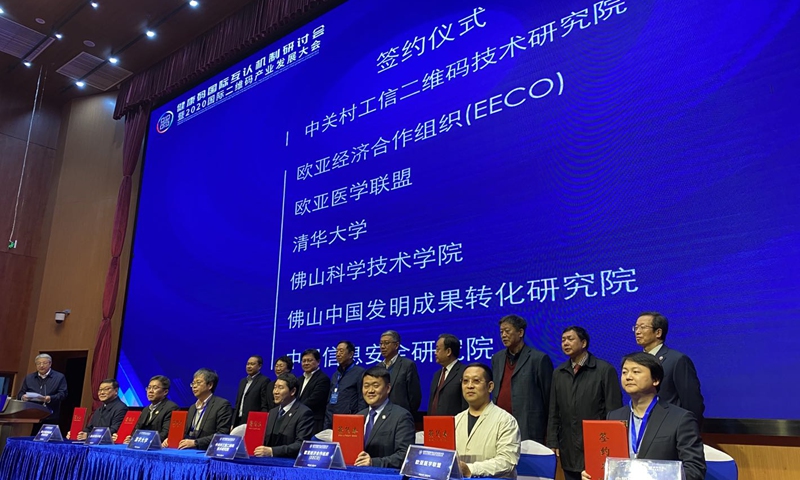Eurasian countries show great interest in China-proposed global COVID-19 QR code
By Zhang Dan in Foshan Source: Global Times Published: 2020/12/22 0:42:48
Technical committee established to push China-proposed mutual recognition

Seminar on International Mutual Recognition Mechanism of Health Code and International Two Dimensional Code Industry Development Conference is held in Foshan, South China's Guangdong Province on Monday. Photo: Zhang Dan/GT
Eurasian countries have shown great interest in an international digital health code mutual recognition mechanism proposed by China to prevent the spread of the coronavirus, said representatives from various medical associations.
"Countries like Russia, Kazakhstan and Armenia have expressed a lot of interest in introducing such a mechanism to push forward global cooperation on the COVID-19 QR code from medical and information technology perspectives," Ge Jian, chairman of the General Council of the Eurasian Economic Cooperation Organization (EECO), told the Global Times during a seminar held in Foshan, South China's Guangdong Province on Monday.
The seminar was held to discuss the international mutual recognition mechanism of health code, which aims to speed up cross-border personnel exchanges by recognizing a person's health status via a QR code that China established months ago to combat the virus.
Ge said the QR code would act as a "digital passport" and may become a necessary step to revive cross-border personnel exchanges and the resumption of work in the post-COVID era, especially between countries establishing "green channels" or "fast lanes." He emphasized the significance of such a mechanism, as travel bans and restrictions have greatly hindered the global economic recovery.
"We are interested in China's experience. China has put the QR health code system into use in more than 100 cities… A QR code that shows a person's health status would greatly ease the burden of medical staff and the whole medical care system," Aizhan Sadykova, president of the Eurasian Medical Association and Kazakhstan Medical Association, said in a virtual speech at the seminar.
Many experts have pointed out that China's proposal must overcome political mistrust and ease concerns over users' privacy and data security.
"The mechanism would be based on four principles: safeguarding the information security of the countries involved, guaranteeing user privacy, standardizing code recognition, and providing efficiency and convenience," Zhang Chao, president of Beijing-based Zhongguancun Industry & Information Research Institute of Two-dimensional Code Technology (ZIIOT), told the Global Times at the seminar, suggesting each country should manage the data of its own citizens.
From a technical perspective, a three-step process would better enhance the protection of user privacy and data security. "A third-party supervisor would recognize who you are, an operator would be responsible for encrypting your data, and the platform would deal with the data," Zhang proposed.
He cited an example of how such a mechanism may work. "If a Russian comes to China, a request will be first sent to the mechanism's global center in order to confirm where the person comes from. Then the information will go to Russia's digital health system and once the person's information is validated, a digital QR health code will be generated and shown to the Chinese border inspection staff," Zhang said.
A study by Oxford University released in April found that if 56 percent of a country's population used a tracking app, the coronavirus epidemic could be completely suppressed.
Countries including Australia, Japan and Singapore have all used tracking apps to trace peoples' movements and potential exposure to COVID-19, but so far there is no mutual recognition mechanism for the apps.
During Monday's seminar, a technical committee was jointly launched by the ZIIOT and the EECO, with the participation of more than 11 organizations and medical associations from Germany, Russia, Mongolia, Uzbekistan, Bulgaria, Pakistan, Kazakhstan, a hospital in Kyrgyzstan, the Fund for Regional Development of Chinese-Armenian Relations, and the Eurasian Medical Association.
Zhang said such a mechanism could have a long-term function. "Whenever a virus crops up, the mechanism would help humans to respond quickly."
The seminar was held by ZIIOT, Guoxin Digital Technology Application Research Institute Foshan and Foshan University.
Newspaper headline: Eurasian countries interested in QR health code
Posted in: INDUSTRIES